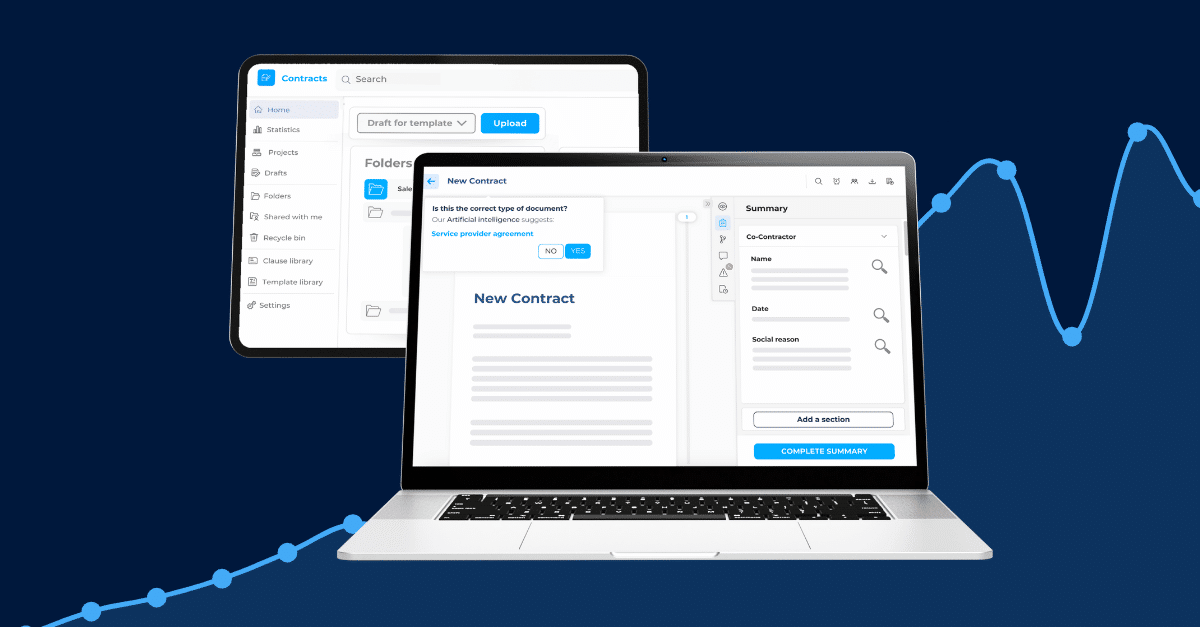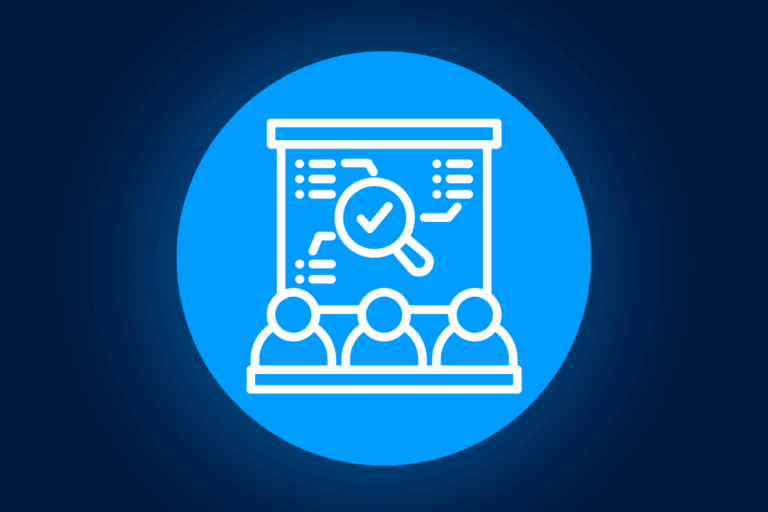Every day, organizations handle numerous contracts across departments, from procurement and sales to legal and finance. These agreements form the foundation of business relationships yet managing them efficiently presents significant challenges. Contract Lifecycle Management (CLM) addresses these challenges by providing a structured approach to handling contracts from creation through contract execution, compliance, and renewal.
This comprehensive guide explores CLM, its functionality, key features, and how it transforms legal operations while delivering substantial business value.
What is Contract Lifecycle Management?
Contract Lifecycle Management refers to the end-to-end process of managing contracts throughout their entire lifecycle. It encompasses every stage from initial request and creation through contract negotiation, approval, execution, ongoing compliance monitoring, and ultimately renewal or termination.
A CLM provides a centralized platform where organizations track and manage contracts systematically. Rather than storing agreements in dispersed locations – email inboxes, shared drives, or physical filing cabinets – CLM offers a unified repository with standardized processes.
The stages of contract lifecycle management typically include:
By structuring these stages within a digital framework, organizations eliminate inefficiencies, reduce risks, and maximize the value of their contractual relationships.
What is a Contract Management Process?
The contract management process is a structured approach to handle contracts from start to finish. It covers contract request, authoring, negotiations, approval, execution, and renewal, ensuring every contract complies with legal requirements and delivers value. The contract review process is critical: teams keep track of terms, obligations, and risks using standardized templates, audit controls, and digital signatures. Modern contract management software uses AI in order to review contracts in seconds.
With a contract management solution, enterprises achieve cost savings, reduce time spent on manual work, and improve compliance. Effective oversight also produces a reliable audit trail, essential in regulated industries where financial accuracy and transparency are required. Well-managed contracts can lead to reduced risk, stronger collaboration, and savings that improve business outcomes.
How Does a CLM Work?
Contract Lifecycle Management solutions operate as centralized platforms which digitize and automate contract processes. Here’s how they function.
Centralized Repository
At its core, a CLM serves as a secure digital repository for all contracts and related documents. This centralization ensures contract data remains accessible, organized, and protected. Rather than searching through multiple systems or physical locations, users find documents through intuitive search functionality, which allows them to read and share data in real time.
Workflow Automation
CLM solutions replace manual handoffs with automated workflows. These workflows route contracts to appropriate stakeholders for review, negotiation, and approval based on predefined rules. For example, a contract exceeding a certain contract value automatically triggers additional approval requirements.
When one stage completes, the system notifies the next participants, eliminating delays and ensuring nothing falls through the cracks. This can help reduce cycle time and therefore saves time across the entire contract workflow.
Template Management
CLM platforms maintain libraries of pre-approved contract templates with standardized language. This streamlines contract creation and ensures consistency across the organization. Legal teams establish these templates with approved clauses, reducing risk and accelerating the drafting process.
Digital Signatures
Electronic signature capabilities eliminate the need for printing, signing, scanning, and mailing contracts. Authorized signatories receive secure links to review and sign documents electronically, dramatically reducing execution time from weeks to minutes. Once a contract is signed, the entire signature process can be tracked.
Analytics and Reporting
Understanding the current state of contract operations is critical to achieving long-term business goals. CLM solutions provide insights and an overview into contract performance through analytics dashboards. These tools highlight upcoming renewals, potential risks, compliance issues, and optimization opportunities. Teams track metrics such as cycle times, negotiation durations, and clause modifications and create reports easily to identify improvement areas. Automated tracking and analytics allow businesses to learn from past agreements, reduce cost, and optimize future workflows. By creating dashboards tailored to different departments, CLM tools give users a full view of obligations, risks, and milestones, helping organizations stay ahead of deadlines and aligned with strategic priorities.
Integration Capabilities
Effective CLM systems integrate with other business applications including Customer Relationship Management (CRM), productivity tools (such as Microsoft Word, Google Suite), and e-signature providers. These integrations enable seamless data flow across the organization, improving visibility and eliminating duplicate data entry.
Essential Features of a CLM
When evaluating a Contract Lifecycle Management solution, several critical features distinguish robust platforms.
AI-Powered Contract Analysis
Advanced CLM solutions employ artificial intelligence to analyze contracts, extract key data points, identify risks, and flag non-standard language. This technology reviews agreements faster and more accurately than manual methods, highlighting clauses which require attention and suggesting improvements based on organizational standards.
DiliTrust’s AI solutions enhance legal and corporate governance by streamlining document management, contract analysis, and board decision-making. Designed for security and accuracy, the AI identifies risks, summarizes key information, and automates approvals. With multilingual support and legal expertise, it boosts efficiency while ensuring compliance and confidentiality in corporate operations.
Customizable Workflows
Every organization has unique approval hierarchies and contract procedures. Effective CLM solutions offer configurable workflows which adapt to these processes rather than forcing standardized approaches. This flexibility ensures the system supports organizational needs while maintaining governance controls.
Comprehensive Search Functionality
The ability to search across all contract content – and not only metadata – enables users to quickly locate specific terms, obligations, or clauses across the contract portfolio. This search capability transforms the contract repository from a static archive into a dynamic knowledge base.
Obligation Tracking
Contracts contain numerous commitments which require monitoring and action. CLM systems track these obligations, sending automated alerts and notifications when action is needed. This proactive approach prevents missed deadlines, price increases, or compliance requirements.
Risk Assessment Tools
Advanced CLM platforms include risk scoring and analysis capabilities which evaluate contracts against organizational standards. These tools identify potential issues early in the negotiation process, allowing legal teams to address concerns before execution.
Audit Trails and Version Control
To maintain compliance and accountability, CLM solutions maintain comprehensive audit trails documenting every interaction with contracts. Version control ensures teams work with current documents while preserving historical versions for reference.
Renewal Management
CLM systems provide visibility into upcoming contract renewals with sufficient advance notice. This proactive approach prevents unwanted auto-renewals and provides leverage for renegotiation when appropriate.
Why Legal Teams Should Use a Contract Lifecycle Management Tool
For legal departments specifically, Contract Lifecycle Management delivers transformative benefits which extend beyond efficiency and productivity.
Reduced Legal Risk
CLM solutions standardize contract language and ensure proper review, significantly reducing organizational exposure. By identifying problematic clauses, tracking obligations, and guaranteeing compliance, legal teams prevent costly disputes and penalties.
Enhanced Productivity
Legal professionals spend less time on administrative tasks and more time on strategic work. Rather than hunting for documents, managing email approvals, or tracking changes manually, attorneys focus on high-value activities which require their expertise.
Improved Visibility
CLM provides legal teams with comprehensive visibility across the contract portfolio. This transparency enables better decision-making regarding renewals, negotiations, and risk management. Legal leaders gain insights into departmental workload, contracting bottlenecks, and improvement opportunities.
Faster Negotiation Cycles
CLM software can streamline the entire negotiation process by providing visibility, version control, and automated approvals—ensuring faster turnaround times and better outcomes for all parties involved. With standardized templates, automated workflows, and digital collaboration tools, legal teams accelerate negotiation cycles. Changes and revisions track automatically, eliminating confusion about the latest version or outstanding issues.
Better Cross-Departmental Collaboration
CLM bridges the gap between legal and other departments. Sales teams gain visibility into contract status; procurement tracks supplier agreements; and finance monitors payment obligations — all within a unified platform. This collaboration eliminates friction and aligns organizational goals.
Compliance Assurance
For regulated industries, CLM solutions ensure consistent adherence to compliance requirements. The system enforces approval workflows, maintains audit trails, and monitors regulatory obligations, protecting the organization from compliance failures.
Data-Driven Decision Making
Analytics within CLM platforms therefore enable legal departments to make strategic decisions based on contract performance data. By leveraging these insights, teams can identify negotiation patterns, track cycle times, and quantify risk exposure, ultimately leading to continuous improvement.
Modern enterprises demand more from legal departments than ever before. As a result, Contract Lifecycle Management offers a comprehensive solution that transforms legal operations not only from reactive to proactive but also from administrative to strategic. By implementing a robust CLM platform, legal teams can thus deliver greater business value while reducing risk and improving efficiency.
For this reason, organizations seeking to optimize their contract process should consider investing in CLM technology. Indeed, this represents a critical step toward the digital transformation of legal operations.
Deciding on the Right Solution
Choosing the right CLM system is a critical decision that can significantly impact an organization’s efficiency and revenue. While some tools may focus only on specific functions, a comprehensive solution helps organizations manage the full lifecycle by using automation and ensuring all parties can collaborate smoothly across every stage of contract management.
Modern contract management systems are built to do it all—supporting contract administration, contract storage, and tracking and reporting across the entire portfolio. They provide visibility and control, deliver transparent contract management processes, and ensure compliance and performance in complex industries. Increasingly, these capabilities are enhanced by Legal AI.
AI should definitely play a valuable role when choosing the right solution. The good news is that AI is already embedded in most modern contract management solutions—and its current capabilities are far more advanced than many organizations realize. In fact, ai can process contracts faster than human review alone, helping companies adapt to increasing demands in today’s fast-paced industry. That being said, rather than replacing legal professionals, AI complements their expertise by automating routine tasks, allowing them to focus more on strategic, high-value responsibilities.
Conclusion
Companies need solutions that go beyond basic document storage and enable more proactive contract management. By applying sophisticated Contract Lifecycle Management (CLM) software to large volumes of data, organizations can streamline the entire contracting process. Moreover, CLM can serve as a central source of truth providing real-time access to key contract data, enabling smarter decisions and ensuring cross-departmental compliance. By automating repetitive tasks and improving contract visibility, companies can reduce errors, save time and cut costs. Also, contract lifecycle management software ensure obligations are met – this is especially important in industries where regulatory compliance and risk exposure are high.
Additionally, machine learning (ML) and artificial intelligence (AI) help in every stage of the contracting process.
Eventually, the right CLM solution not only supports legal processes, but also promotes company-wide efficiency and helps companies to remain competitive, agile and future-proof. For any company looking to improve its contract processes, investing in CLM technology is no longer optional, it’s essential.
Ready to optimize your contract management process? Book a demo today to see how our CLM solution is streamlining and automating legal operations to drive business success.




